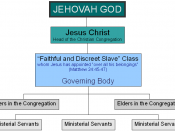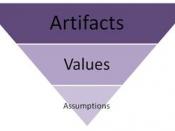1.0 Introduction
Each organisation has its own way of doing what it does and its own way of talking about what it is doing, its own culture. Culture can be described as the assumptions, values, behaviors and artifacts that an organisation exhibits. It is what makes one organisation different from another, from the employees who work there, the rites and rituals of daily work, the practices and procedures to the layout of the building and offices.
"While we may describe an organisation by referring to its formal structure, it tells us little about what it feels like to work in such organisations. Such formal descriptions of organisations rarely capture the essence of life in the company, what it feels like to be part of a large or small firm, what the other employees are like, whether you are expected to treat the boss with some deference, or whether a more egalitarian relationship is preferred."[Wilson,
D. C. & Rosenfeld, R. H. (1990)] All of these aspects describe aspects of organisational culture. Organisational culture is often intangible but one can describe its manifestations and its effects upon the member of an organisation.
Organisational culture is an emerging and dynamic mixture. As culture is made of so many different components, it can be complex and difficult to describe. It changes over time as people come and go within a business and is created through employee's actions, decisions and communication with each other. It is important to understand how the organisation culture affects daily activities and business operations of the organisation.
This report explains the concept of organisational culture, its characteristics and the various perspectives on organisational culture. We shall also discuss the extent to which an organisational culture can be changed or managed.
2.0 The concept of Organisational Culture
2.1 The main...


